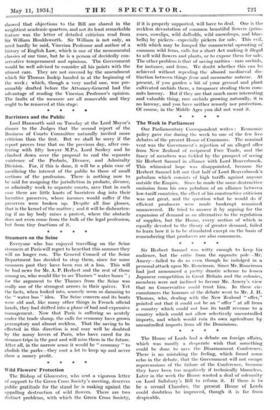Wild Flowers' Protection The Bishop of Gloucester, who sent a
vigorous letter of support to the Green Cross Society's meeting, deserves public gratitude for the stand he is making against the appalling destruction of wild flowers. There are two distinct problems, with which the Green Cross Society, if it is properly supported, will have to deal. One is the reckless devastation of common beautiful flowers (prim- roses, cowslips, wild daffodils, wild snowdrops, and blue- bells) by pickers—especially pickers for sale. This evil, with which may be lumped the commercial uprooting of common wild ferns, calls for a short Act making it illegal to sell wild flowers and plants, or to expose them for sale. The other problem is that of saving rarities—rare orchids, for instance, and ferns. We doubt whether this can be achieved without repealing the absurd mediaeval dis- tinction between things ferae and mansuetae naturae. At present, if you garden a bit of your ground and plant cultivated orchids there, a trespasser stealing them com- mits larceny. But if they are that much more interesting and valuable thing, rare orchids growing naturally, it is no larceny, and you have neither remedy nor protection. Of course, in the Middle Ages you did not want it.








































 Previous page
Previous page